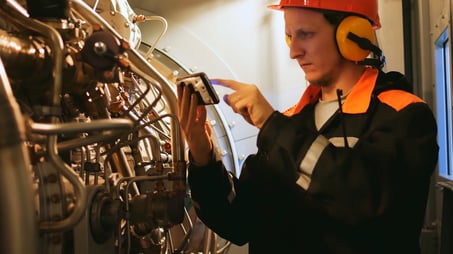Recently, I wrote about the recent Boeing 737 Max 9 incident, which – thankfully – did not result in any deaths or major injuries, but did result in the grounding of all Max 9s by the FAA. Now, Boeing has issued emergency inspection directives and major airlines are scrambling to get inspections completed and results sent back to the FAA for review.
Inspections are More Critical Than Ever
 Inspections are no joke. Each year, automobile inspections save lives, as the age of vehicles on the road increases. In our own homes, monthly fire alarm checks and annual battery replacements ensure safe operation in case of a fire. These small practices save thousands of lives yearly.
Inspections are no joke. Each year, automobile inspections save lives, as the age of vehicles on the road increases. In our own homes, monthly fire alarm checks and annual battery replacements ensure safe operation in case of a fire. These small practices save thousands of lives yearly.
Inspection Quotas Remain a Challenge
When it comes to commercial inspections, the risks and impacts increase exponentially. Whether equipment, bridges, buildings, or food, these checks save lives. Unfortunately, staffing and processes remain an issue and the number and quality of inspections often fall short of what's needed or even what's required. Often, inspectors are in short supply, inspectors lack training, checklists aren't updated, data is not reportedly efficiently, or organizations fail to take action on those inspections,
Across industries, the complexity of the equipment, changing specifications, staff in constant flux, and changing regulations can impact the timeliness, accuracy, and completeness of inspections. Even the FDA fell short on its food safety inspections despite a congressional mandate.
Unfortunately, when inspections aren’t completed or completed properly tragedy can strike.
When Inspections Fail
In an increasingly complex world, with more automated equipment, more specializations, a plethora of materials and tighter regulations, proper inspections are paramount.
 The 2010 Deepwater Horizon Oil Spill – Incomplete Inspections
The 2010 Deepwater Horizon Oil Spill – Incomplete Inspections
On April 20, 2010, catastrophic failures at BP’s Deepwater Horizon drilling rig in the Gulf of Mexico led to the death of 11 employees and one of the worst oil leaks in history. While multiple factors contributed to this disaster, inspectors’ inability to properly interpret pressure tests to determine if the well was sealed or not was cited as one cause. An investigation by the U.S. Chemical Safety Board (CSB) also determined that, while inspections were performed regularly on the rig, emergency systems were not regularly inspected.
Surfside Florida Condo Collapse – Delayed Remediation
 Ninety-eight people were killed in June of 2021 when the Champlain Towers South condo collapsed in Surfside Florida. Major structural damage was noted in a 2018 Structural Field Survey report, but the condo owners delayed proper maintenance. The tragedy resulted in a judge approving a $1 billion settlement to victims and their families last June and the passing of the Florida Condo Safety Act, which requires more stringent and frequent condo inspections. A full investigation of the causes of the collapse is underway by the National Institute of Standards and Technology, and final findings and recommendations are expected in June 2025.
Ninety-eight people were killed in June of 2021 when the Champlain Towers South condo collapsed in Surfside Florida. Major structural damage was noted in a 2018 Structural Field Survey report, but the condo owners delayed proper maintenance. The tragedy resulted in a judge approving a $1 billion settlement to victims and their families last June and the passing of the Florida Condo Safety Act, which requires more stringent and frequent condo inspections. A full investigation of the causes of the collapse is underway by the National Institute of Standards and Technology, and final findings and recommendations are expected in June 2025.
Station Nightclub Fire – Improper Inspections
 More than 100 people were killed with nearly 230 injured at the Station Nightclub in West Warwick, Rhode Island, when a fire broke out in February 2003. In addition to overcrowding, locked doors, and lack of exit lighting, the investigation uncovered that one cause of the tragedy included a breakdown in the fire safety inspection protocol process. For example:
More than 100 people were killed with nearly 230 injured at the Station Nightclub in West Warwick, Rhode Island, when a fire broke out in February 2003. In addition to overcrowding, locked doors, and lack of exit lighting, the investigation uncovered that one cause of the tragedy included a breakdown in the fire safety inspection protocol process. For example:
- Once the facility was converted from a restaurant to a nightclub, inspectors should have required sprinklers instead of fire extinguishers.
- During inspections, the fire marshal did not detect or note the presence of flammable acoustic foam in the facility.
In each case, improper training, incomplete information, or delays led to inspections failing to keep people safe. Inspections aren't useful if they aren't timely, accurate, and complete. Additionally, inspectors and analysts must understand the data they are collecting or viewing and have clear instructions for what to do with data and insights.
We have great power to prevent accidents and tragedies, but we must ensure inspections are completed and completed accurately.
The Importance of Timely, Accurate, Comprehensive, and Actionable Inspections
 Modern inspections require photographic evidence, careful time and date recording, complex calculations and measurements, and signoffs. Once an inspection is complete, business workflows must incorporate that information to enable emergency stops, repairs, or escalation. Careful documentation must be part of the process, to ensure regulations are met and an accurate, complete record is kept.
Modern inspections require photographic evidence, careful time and date recording, complex calculations and measurements, and signoffs. Once an inspection is complete, business workflows must incorporate that information to enable emergency stops, repairs, or escalation. Careful documentation must be part of the process, to ensure regulations are met and an accurate, complete record is kept.
Digital Inspections: The Power of Digital Data
Paper and clipboards no longer meet modern inspection requirements. Inspectors should use modern technology to collect digital data. Inspections that include digitized documentation, checklists, images, videos, audio, time/date stamping, and verified digital signatures are more timely, accurate, and safer. Digitized data can be instantly shared and analyzed in powerful data visualization tools. Records can be pulled and assembled for regulatory agencies or root cause analysis.
Moving to Mobile Apps
 Mobile apps are the new paper-and-clipboard, but they go so much further than that. While they can capture all the information listed above, they can also help inspectors by:
Mobile apps are the new paper-and-clipboard, but they go so much further than that. While they can capture all the information listed above, they can also help inspectors by:
- performing or validating calculations for inspections to ensure data accuracy
- providing videos to help inspectors interpret measurements or test results
- automatically pre-filling basic equipment or location information to enable inspectors to spend more of their time on critical aspects of each inspection
- automatically delivering data to systems or dashboards that enable faster action on the findings
- transparency and visibility to confirm that the inspection was completed and done comprehensively.
Accurate Inspections, Better Training of Inspectors
 When inspections go digital, there is the opportunity to help guide inspectors through the process.
When inspections go digital, there is the opportunity to help guide inspectors through the process.
Intelligent apps can assist inspectors in many ways. Workflows can help complete the inspection properly. For example, an intelligent app can validate or reject measurements or augmented reality can validate an image to assist the inspector during the inspection. By scanning a bar code, the inspector could access the complete specs on a piece of equipment so s/he is confident they're using the right guidance.
Often inspectors encounter issues out in the field during an inspection and need proper guidance. If the inspector finds that a measurement falls out of accepted parameters, the app could automatically trigger a repair or even pull up a video to show the inspector how to conduct a proper adjustment on the equipment.
Up-to-Date Checklists and Processes
 Customer feedback, material changes or issues happen and inspection processes must immediately change. Manufacturers must be prepared to efficiently update and distribute new inspection protocols, parameters or checklists to all inspectors. In virtually all cases, time is of the essence -- just look at the case of the Boeing 37 Max 9. Editing, reprinting, and redistributing paper forms can be a monumental task.
Customer feedback, material changes or issues happen and inspection processes must immediately change. Manufacturers must be prepared to efficiently update and distribute new inspection protocols, parameters or checklists to all inspectors. In virtually all cases, time is of the essence -- just look at the case of the Boeing 37 Max 9. Editing, reprinting, and redistributing paper forms can be a monumental task.
Digital data collection methods can be quickly adjusted and distributed. For example, an inspection process in a mobile app can usually be updated in minutes and distributed to all inspectors, partners, or customers with the push of a button. Within minutes or hours, inspectors on the front lines can adjust their tasks and be conducting inspections under new guidelines.
The Best Digital Inspection Software
 When lives are at stake and time is critical, you want software that is flexible, responsive, and accurate.
When lives are at stake and time is critical, you want software that is flexible, responsive, and accurate.
Alpha Software Corp. works with organizations of all sizes across a range of industries to help improve product quality through better data collection, analysis, and action. Our custom inspection apps, visual dashboards, and workflow solutions enable companies to:
- collect accurate data while speeding daily inspection efforts
- improve the depth and breadth of inspection data companies are collecting
- better analyze, track, and act on the inspection data they collect to improve product quality and customer satisfaction.
 Manufacturing Expertise
Manufacturing Expertise
Manufacturers choose Alpha Software to craft their inspection apps because our software gives manufacturers the ability to build powerful apps that can handle complex inspection jobs while allowing them to build these apps quickly and for low risk and cost. When manufacturers need to adjust their processes, our apps give them the ultimate in flexibility, so they can change processes on the fly and tie into any system or data source they require. The apps can also work in a variety of inspection environments, even remote locations or warehouses that don't have a WiFi or cell signal.
We'll Understand Your Process and Build Custom Apps for You
If you'd prefer, contact us directly to schedule a demo.







Comment